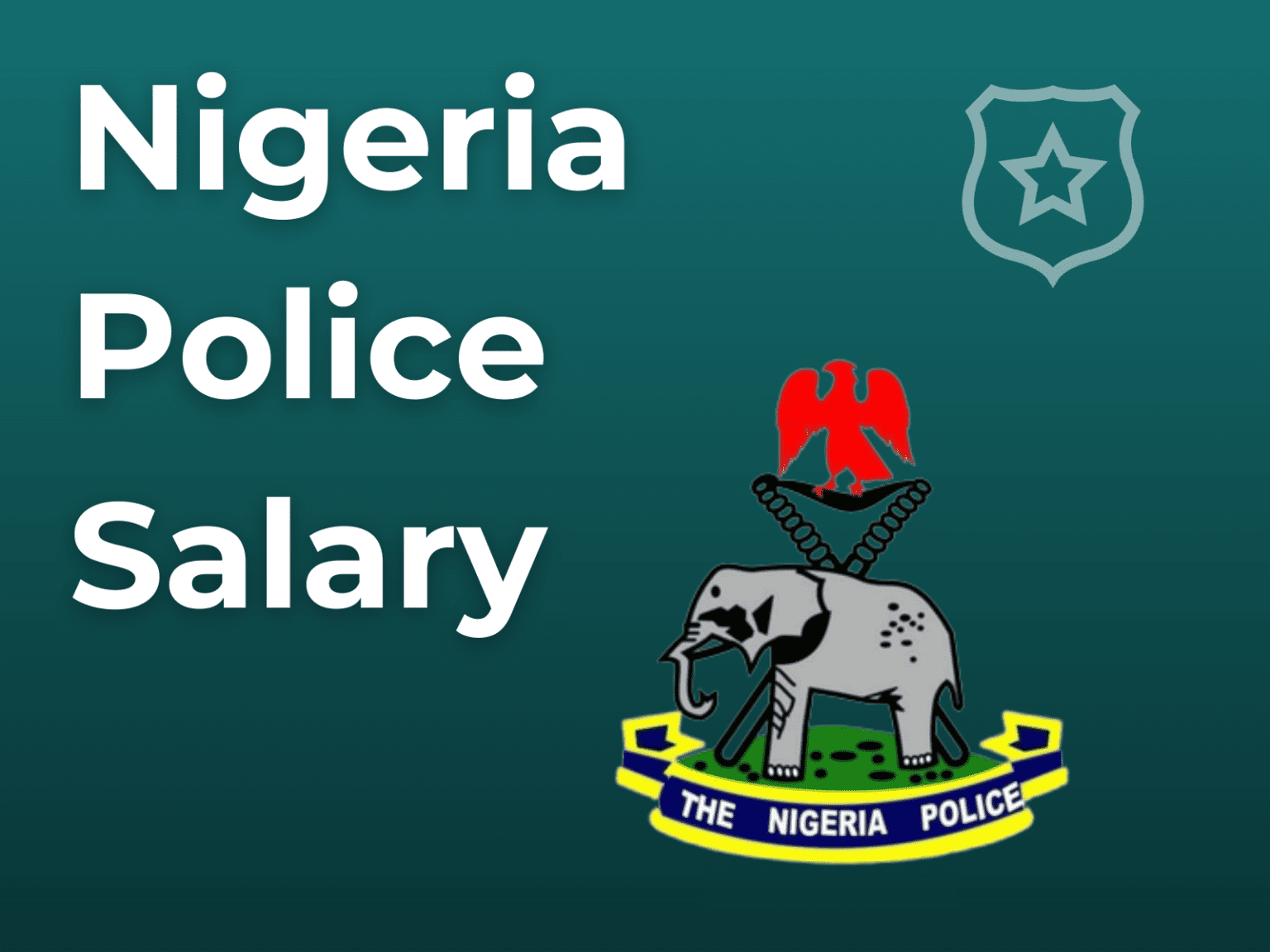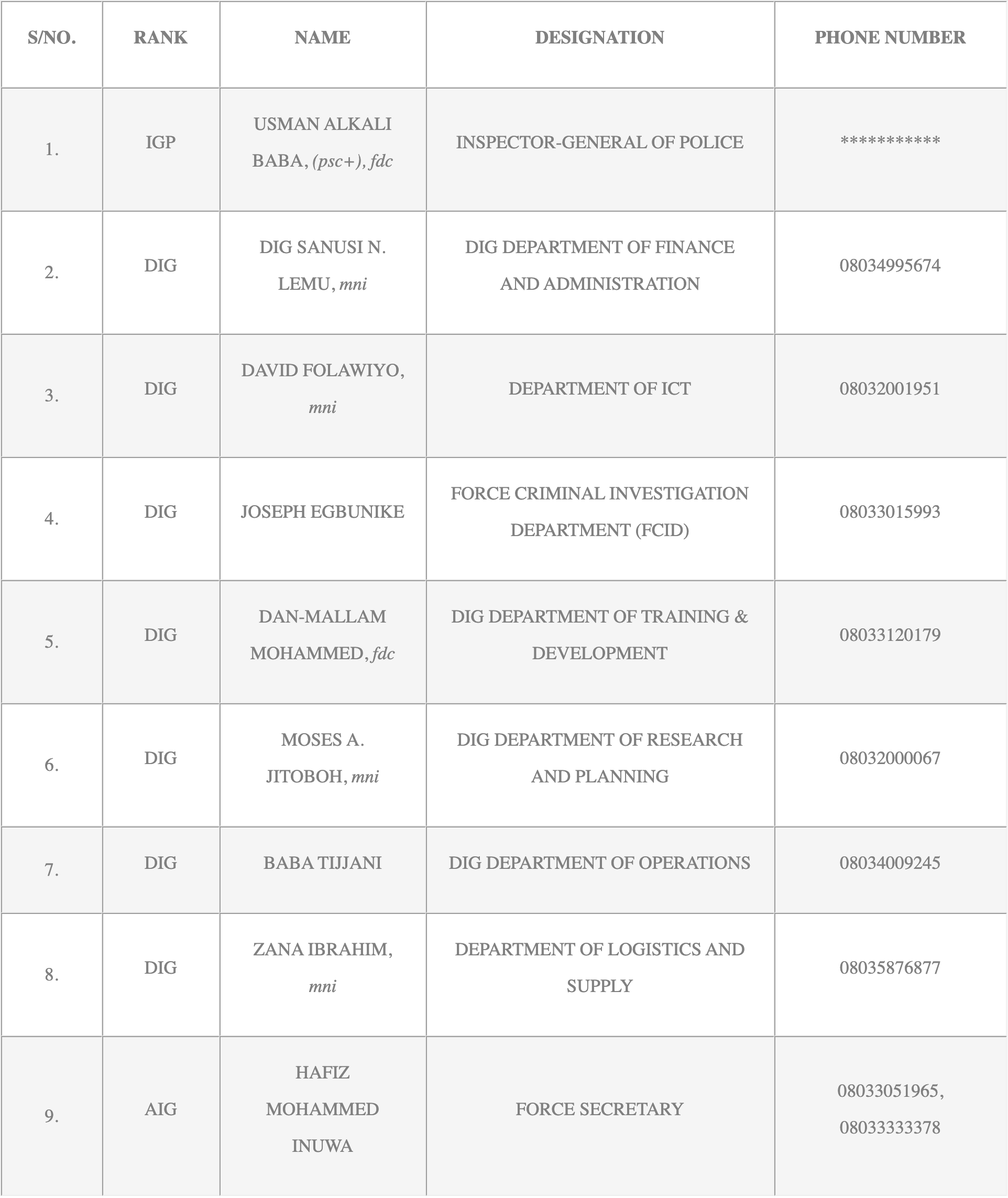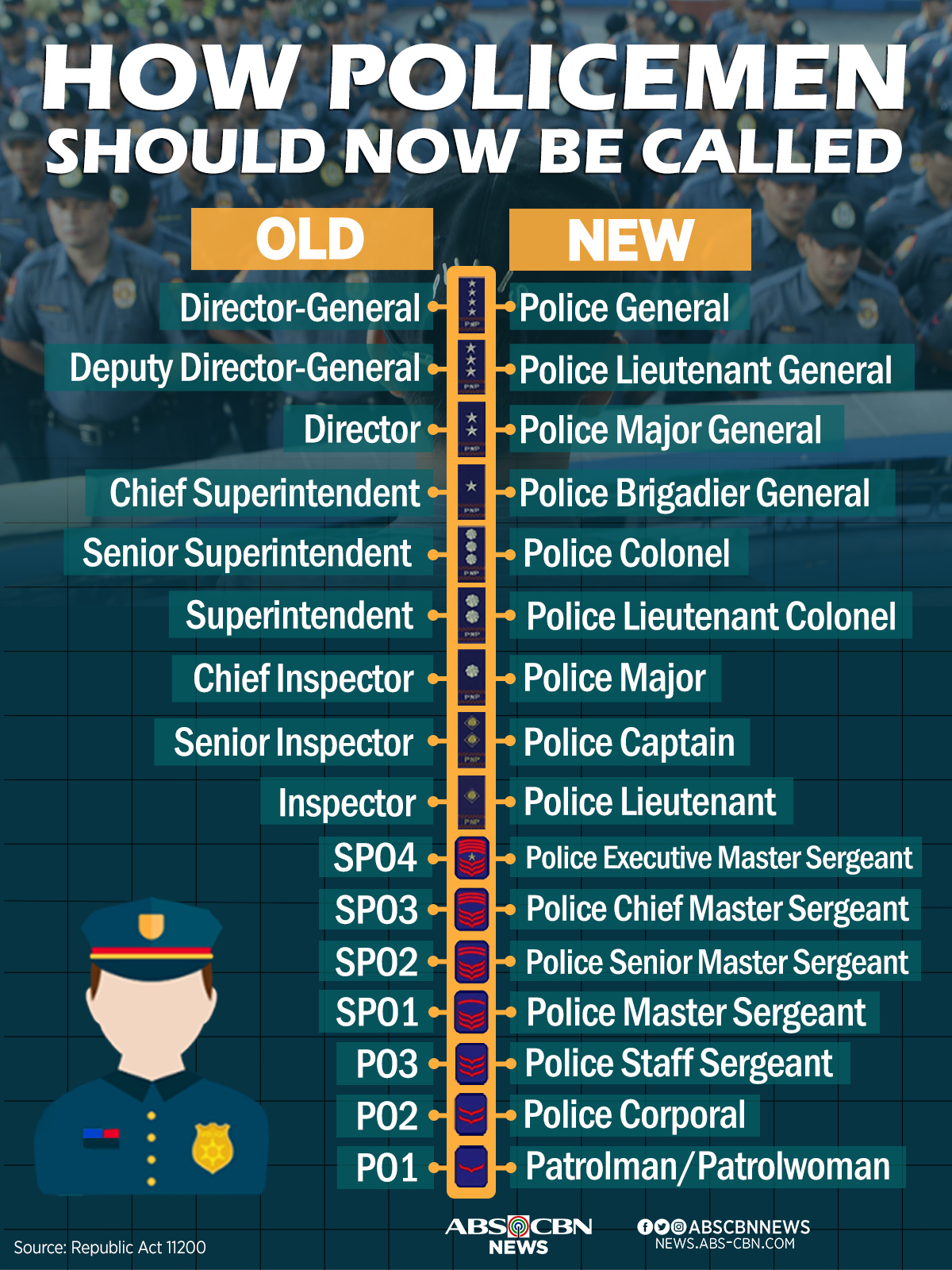Ever wondered about the structure of the Nigerian Police Force? Let’s dive deep into the Nigeria police ranks and break it all down for you, mate. If you’re looking for clarity on how the force operates, you’re in the right place. We’re about to spill the tea on the hierarchy, responsibilities, and more. So, buckle up!
When it comes to law enforcement in Nigeria, the police force plays a crucial role. But did you know that the ranks within the Nigeria Police Force are pretty intricate? Understanding these ranks can give you a clearer picture of how the system works. Whether you're a citizen, a student, or just curious, this guide will walk you through everything you need to know.
From the top brass to the officers on the ground, every rank has its own significance. In this article, we’ll explore the different tiers, highlight key responsibilities, and even touch on some interesting facts. Stick around, because by the end of this, you’ll be an expert on Nigeria police ranks!
Table of Contents
- Overview of Nigeria Police Ranks
- Biography of the Nigeria Police Force
- The Hierarchy: Who’s Who in the Force
- The Commissioner of Police
- Inspector General of Police
- Mid-Level Officers: The Backbone of the Force
- Constables: The Frontline Warriors
- Promotions: How Officers Climb the Ranks
- Challenges Faced by the Nigeria Police Force
- The Future of Nigeria Police Ranks
- Wrapping It All Up
Overview of Nigeria Police Ranks
The Nigeria Police Force is one of the largest police forces in Africa, and its ranks are structured to ensure efficiency and order. The force is divided into various levels, each with distinct roles and responsibilities. This structure helps in maintaining law and order across the country.
Now, let’s take a closer look at the Nigeria police ranks. At the top, you’ve got the Inspector General of Police, who oversees the entire force. Below them, there’s a chain of command that includes Commissioners, Assistant Inspectors, and all the way down to the constables. Each rank has its own set of duties, and the system is designed to ensure smooth operations.
But why is understanding these ranks important? Well, for starters, it gives you a better appreciation of how the police force functions. It also helps in understanding the decision-making process within the force. Plus, it’s always good to know who’s in charge when you need to reach out for assistance.
Biography of the Nigeria Police Force
Before we dive deeper into the ranks, let’s take a moment to understand the history of the Nigeria Police Force. Established way back in 1879, the force has evolved significantly over the years. It started as a small unit in Lagos and gradually expanded to cover the entire country.
Today, the Nigeria Police Force is a well-organized institution with over 370,000 personnel. Its primary role is to maintain law and order, protect lives and property, and prevent crime. The force is divided into various departments, each focusing on specific areas such as traffic management, criminal investigations, and community policing.
Here’s a quick glance at the key facts about the Nigeria Police Force:
| Established | 1879 |
|---|---|
| Headquarters | Force Headquarters, Abuja |
| Personnel | Over 370,000 |
| Chief Officer | Inspector General of Police |
The Hierarchy: Who’s Who in the Force
Alright, let’s get into the nitty-gritty of the hierarchy. The Nigeria police ranks are divided into three main categories: senior officers, middle-level officers, and junior officers. Here’s a breakdown:
- Senior Officers: These include the Inspector General of Police, Commissioners, and Assistant Inspectors.
- Middle-Level Officers: This group consists of Superintendents, Inspectors, and Sergeants.
- Junior Officers: These are the constables who form the backbone of the force.
Each category has its own set of responsibilities, and the chain of command ensures that orders flow smoothly from the top to the bottom.
The Commissioner of Police
The Commissioner of Police is one of the key figures in the Nigeria Police Force. They are responsible for overseeing police activities in their respective states. Commissioners work closely with the Inspector General to ensure that the force operates efficiently.
Some of the duties of a Commissioner include:
- Supervising police operations in their state.
- Coordinating with other law enforcement agencies.
- Implementing policies set by the Inspector General.
Being a Commissioner is no easy task. It requires a combination of leadership skills, strategic thinking, and a deep understanding of the law. But hey, if you’re up for the challenge, this could be the role for you!
Inspector General of Police
At the very top of the hierarchy is the Inspector General of Police. Often referred to as the IGP, this individual is the chief officer of the force. The IGP is appointed by the President and is responsible for the overall administration of the police force.
Some of the key responsibilities of the IGP include:
- Setting policies for the force.
- Overseeing major operations.
- Representing the force at national and international levels.
The IGP plays a crucial role in shaping the direction of the police force. They work tirelessly to ensure that the force is equipped to handle the challenges of modern-day policing.
Mid-Level Officers: The Backbone of the Force
Now, let’s talk about the mid-level officers. These guys are the backbone of the force, and they play a vital role in day-to-day operations. Mid-level officers include Superintendents, Inspectors, and Sergeants.
Superintendents are responsible for overseeing police stations and ensuring that operations run smoothly. Inspectors, on the other hand, focus on specific tasks such as criminal investigations. Sergeants act as supervisors for the constables and ensure that orders are carried out effectively.
Each of these roles requires a unique set of skills, and the officers in these positions are often the ones who bridge the gap between senior management and frontline personnel.
Constables: The Frontline Warriors
At the bottom of the hierarchy, but certainly not the least important, are the constables. These are the officers who are out there on the streets, keeping us safe. Constables are the first point of contact for the public, and they play a crucial role in maintaining law and order.
Some of the duties of a constable include:
- Patrolling the streets.
- Responding to emergencies.
- Assisting the public with various issues.
Being a constable is a tough job, but it’s also incredibly rewarding. These officers are the ones who make the biggest impact on the ground, and their work is essential for the safety of the community.
Promotions: How Officers Climb the Ranks
So, how do officers move up the ranks? Promotions in the Nigeria Police Force are based on a combination of factors, including performance, experience, and training. Officers who demonstrate exceptional skills and dedication are often rewarded with promotions.
Here are some of the key factors that influence promotions:
- Performance evaluations.
- Length of service.
- Completion of advanced training programs.
It’s worth noting that promotions are not automatic. Officers need to work hard and prove their worth to move up the ranks. But for those who are committed, the opportunities for advancement are there.
Challenges Faced by the Nigeria Police Force
Like any large organization, the Nigeria Police Force faces its share of challenges. Some of the key issues include:
- Limited resources.
- Corruption and misconduct.
- Handling complex security situations.
Despite these challenges, the force continues to make strides in improving its operations. Efforts are being made to modernize equipment, enhance training programs, and promote transparency within the ranks.
The Future of Nigeria Police Ranks
Looking ahead, the future of the Nigeria Police Force looks promising. With ongoing reforms and modernization efforts, the force is well-positioned to tackle the challenges of the future. Advances in technology, improved training programs, and a focus on community policing are just some of the ways the force is evolving.
As the country continues to grow, the role of the police force will become even more critical. By strengthening the ranks and ensuring that officers are well-equipped to handle modern-day challenges, the force can continue to serve the nation effectively.
Wrapping It All Up
There you have it, folks! A comprehensive guide to the Nigeria police ranks. From the top brass to the constables on the ground, each rank plays a vital role in maintaining law and order in the country. Understanding these ranks gives us a better appreciation of how the police force functions and the challenges it faces.
So, what’s next? If you’ve enjoyed this article, why not share it with your friends? And if you’ve got any questions or thoughts, drop them in the comments below. Let’s keep the conversation going and help each other learn more about the Nigeria Police Force!



Detail Author:
- Name : Rene Gusikowski
- Username : raynor.lazaro
- Email : adell94@yahoo.com
- Birthdate : 1992-08-20
- Address : 4626 Hintz Prairie Suite 584 Champlinland, HI 19036-5815
- Phone : 818.564.6191
- Company : Heathcote-VonRueden
- Job : Physics Teacher
- Bio : Illum odio optio quia pariatur magni molestias dolor. Neque ex animi consequatur optio harum nostrum facere. Et qui harum consequatur quam. Nulla commodi eum nam quo explicabo enim.
Socials
linkedin:
- url : https://linkedin.com/in/mike_harvey
- username : mike_harvey
- bio : Velit animi culpa sapiente corporis voluptas est.
- followers : 3462
- following : 1189
tiktok:
- url : https://tiktok.com/@mike_official
- username : mike_official
- bio : Rerum animi occaecati ea dolores exercitationem.
- followers : 3975
- following : 2834
twitter:
- url : https://twitter.com/mike.harvey
- username : mike.harvey
- bio : Aliquid quo est et ut. Natus aut non est odit voluptatem. Voluptatum dolorem deserunt quis quos libero hic repudiandae. Et qui qui voluptatem fugit.
- followers : 6575
- following : 560
instagram:
- url : https://instagram.com/mike.harvey
- username : mike.harvey
- bio : Quia qui ipsa et aperiam aut dignissimos maiores voluptatem. Facere sunt aliquid quod et.
- followers : 298
- following : 2666